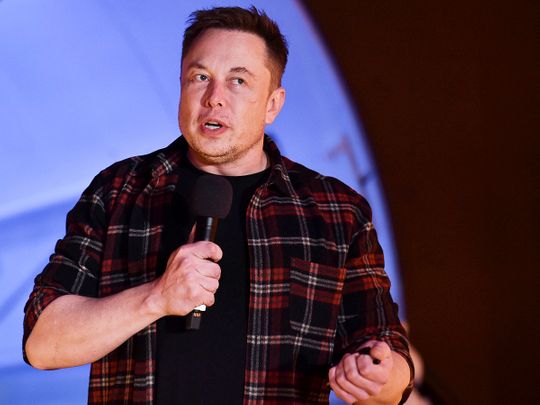
Elon Musk is about to urge a judge to go easy on him for tweets that US regulators contend violated a court order, though legal experts say the pugnacious billionaire will have a hard time avoiding some kind of punishment.
The founder of electric-car maker Tesla Inc. is in hot water with the Securities and Exchange Commission over statements last month to his 25 million Twitter followers about the company’s vehicle deliveries. The SEC says the missives violate terms of an earlier settlement prompted by his misleading August tweets about taking Tesla private.
“The SEC will press hard on this,” said Stephen Crimmins, a former agency enforcement lawyer who is now a partner at Murphy & McGonigle. “Disobeying an order of the court is an insult to the court and the judge. So the court has to take this seriously.’
At the SEC’s request, US District Judge Alison Nathan in Manhattan ordered Musk to explain by Monday why he shouldn’t be held in contempt of court. In an earlier settlement over his August tweets, Musk was fined $20 million (Dh73.44 million), forced to give up his job as Tesla chairman, and required to consult a so-called Twitter Sitter before posting statements about the company on social media.
Musk, who remains chief executive officer and Tesla’s largest shareholder, has already given signs of his legal arguments — that he didn’t disclose new information, the statements weren’t significant enough to get a reasonable investor to buy or sell Tesla shares, and he shouldn’t face penalties that would hurt the company.
His latest tussle with the SEC centers on a February 19 tweet, in which Musk said Tesla would make about half a million cars in 2019. A few hours later, he revised his statement to clarify he meant the figure was an “annualised production rate” of about 500,000, or about 10,000 cars per week, by the end of the year. Deliveries would reach only about 400,000, he said.
On Feb. 22, in a letter response to an SEC inquiry, Tesla attorney Bradley Bondi noted that Musk’s initial tweet, and the later one “clarifying” his statement, were made after the close of trading in shares on Nasdaq, limiting the market impact. Bondi also said Musk believed the information had already been reviewed for a Jan. 30 earnings call.
Stanford Law School Professor Joseph Grundfest said Musk is likely to advance two key claims. First, he’ll argue that he believed, in good faith, “that his tweet did not contain and could not reasonably contain material information because he saw it as simply repeating information already known to the market,” Grundfest said.
Musk will also “likely argue that the correction made the initial tweet more precise, but does not suggest that the first tweet was material,” Grundfest said.
To be sure, Musk has remained defiant. After the regulator filed the contempt allegation, he tweeted, “Something is broken with SEC oversight.”
He also replaced his lawyers in the case, turning to a firm led by former Enron prosecutor John C Hueston of Hueston Hennigan LLP in Los Angeles. Hueston is defending Musk in a defamation lawsuit by British caver Vernon Unsworth, whom Musk called a “pedo guy” in a tweet. Hueston’s firm replaces Williams & Connolly, the home of Dane Butswinkas, Tesla’s former chief in-house lawyer.
Legal experts expect the SEC will persuade the judge to impose some kind of penalty on Musk.
“They’re going to come down pretty hard on him,” said Elliot Lutzker, a former SEC lawyer and an expert in securities-law compliance. “They could seek a suspension, just to teach him a lesson, give him a warning.’
While the judge has broad powers, she isn’t likely to come down too hard on the Tesla CEO for fear of harming the company, legal experts said. She has the power to bar him from running Tesla or any other public company but could also impose less onerous punishment through new fines or stricter controls on his use of social media.
“The SEC isn’t trying to hurt Tesla shareholders or to put the company in a worse position than it’s in,” Lutzker said.
A permanent ban is probably off the table, according to the lawyers.
“They should take his phone away,” said John C Coffee Jr, a law professor at Columbia University and director of the Centre on Corporate Governance.
The case is US Securities and Exchange Commission v. Musk, 18-cv-08865, US District Court, Southern District of New York (Manhattan).










